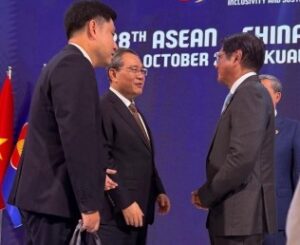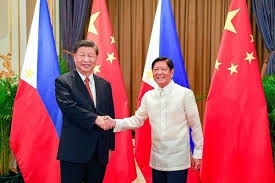KUALA LUMPUR, Malaysia — President Ferdinand R. Marcos Jr. delivered a firm message to China regarding its assertive actions in the South China Sea, emphasizing that diplomatic engagement cannot coexist with intimidation. During his intervention at the 28th ASEAN-China Summit with Chinese Premier Li Qiang in Kuala Lumpur on Tuesday, Marcos reiterated Manila’s openness to cooperation but drew a clear line against aggressive behavior.

Drawing a Red Line on Coercion
Marcos stressed that while the Philippines is committed to working with both the 11-member Association of Southeast Asian Nations (ASEAN) bloc and Beijing on diplomatic and mutually beneficial initiatives, the terms of engagement must be respected by all sides.
“The Philippines stands ready to work with ASEAN and China to translate our commitments into meaningful outcomes through mutually beneficial cooperation,” he stated. However, he immediately followed this with a powerful qualifier: “It must be clear, however, that this cooperation cannot exist alongside coercion.”
The Philippine President asserted that any successful partnership must be built on the fundamental principles of “mutual respect for sovereign equality and adherence to international law.” By strictly adhering to these guidelines, Marcos believes China and ASEAN can ensure their collaboration continues to deliver genuine benefits to their citizens while advancing the shared vision of peace, stability, and prosperity throughout the region.
Call for Self-Restraint Amid Harassment
Marcos did not shy away from voicing the Philippines’ deep concerns over persistent dangerous actions and harassment targeting Filipino fishers and vessels in the West Philippine Sea (the parts of the South China Sea claimed by the Philippines).
He made a strong appeal for restraint from all parties, noting that a “pathway for the South China Sea to remain a sea of peace” requires everyone to exercise self-control.
“Otherwise, the failure to restrain provocative and dangerous actions further threatens the peace and stability that we have collectively built and cultivated over many years,” Marcos warned.
In a direct rejection of a reported Beijing proposal, Marcos reiterated Manila’s opposition to China’s alleged plan to convert Bajo de Masinloc (Scarborough Shoal) into a “nature reserve.” He maintained that such a unilateral move “has no legal basis or effect, clearly disregards international law, and infringes on the Philippines’ sovereignty, sovereign rights, and jurisdiction.”
Diplomacy as a Tension Easer
Despite the ongoing tensions, Marcos affirmed Manila’s steadfast commitment to managing differences through constructive means.
He highlighted the success of the Provisional Understanding with China, which allowed for 10 successful and incident-free rotation and resupply missions to the BRP Sierra Madre at Ayungin Shoal (Second Thomas Shoal). This understanding, he noted, serves as a crucial case study.
“Our Provisional Understanding is but one demonstration of how effective diplomacy and candid dialogue can ease tensions and produce positive outcomes that help manage the situation at sea, without prejudicing national positions,” Marcos said, urging all nations to “widen our diplomatic creativity for this purpose.”
Pushing for an Effective Code of Conduct (COC)

On the diplomatic front, Marcos pledged that the Philippines will work closely with ASEAN partners to finalize an effective Code of Conduct (COC) in the South China Sea. He stressed that the final document must be consistent with international law, particularly the United Nations Convention on the Law of the Sea (UNCLOS), but must simultaneously “not diminish the rights and interests of third parties.”
The desire for an internal, regional solution was echoed by ASEAN Chair and Malaysian Prime Minister Anwar Ibrahim at the 20th East Asia Summit. Ibrahim stated that ASEAN prefers the issues in the South China Sea to be “resolved within ASEAN, and with our partners in the region.”
“Because the moment it is seen to be imposed and dictated by outside forces, things become more problematic and tense. As far as we are concerned, things are still under control,” the Malaysian leader commented.
Pending the finalization of the COC, Marcos urged ASEAN and China to proactively explore cooperative activities and mechanisms—within the framework of the 2002 Declaration of Conduct of Parties in the South China Sea—to prevent risks of incidents at sea. These suggestions included:
Allowing artisanal fisherfolk to access their traditional fishing grounds without interference.
Establishing arrangements to limit activities in uninhabited features.
Initiating scientific cooperation, including on ocean meteorology, to enhance maritime safety and mitigate risks to marine biodiversity, potentially aligning with the BBNJ Agreement (Agreement on Marine Biological Diversity of Areas Beyond National Jurisdiction).
President Marcos Jr.’s intervention in Kuala Lumpur clearly positioned the Philippines as a nation committed to peace and dialogue, but one that will not compromise its sovereignty or allow cooperation to be undermined by coercion.





